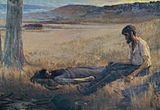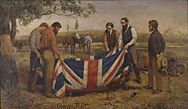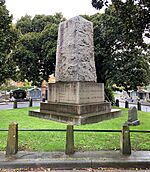Robert O'Hara Burke facts for kids
Quick facts for kids
Robert O'Hara Burke
|
|
|---|---|
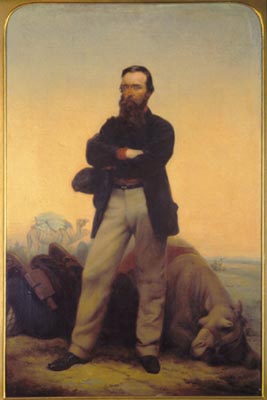
Robert O'Hara Burke (painted by William Strutt)
|
|
| Born | 6 May 1821 St Clerens, County Galway, Ireland
|
| Died | 28 June 1861 (aged 40) Cooper Creek, South Australia, Australia
|
| Nationality | Irish |
| Occupation | Soldier, police officer, explorer |
| Years active | 1841−1861 |
| Known for | Death after leading the Burke and Wills expedition |
Robert O'Hara Burke (born May 6, 1821 – died around June 28, 1861) was an Irish soldier and police officer. He became famous as an Australian explorer. He led the unlucky Burke and Wills expedition. This was the first trip to cross Australia from south to north. They found a path across the continent from Victoria to the Gulf of Carpentaria. The group had good supplies. However, Burke was not very skilled at living in the wilderness. Later, an official investigation looked into why the trip failed. They found that some of Burke's decisions were not good.
Contents
Robert Burke's Early Life
Robert Burke was born in St Clerans, County Galway, Ireland. This was in May 1821. He was the second of three sons. His father, James Hardiman Burke, was a British army officer. His mother was Anne Louisa Burke.
Robert had six brothers and sisters:
- John Hardiman Burke
- James Thomas Burke
- Fanny Marie Burke
- Elizabeth Burke
- Hester Albinia Burke
- Anne Celestine Burke
His brother, James Thomas Burke, was a Lieutenant in the Royal Engineers. He was the first British officer to die in the Crimean War. This happened in 1854 during a battle.
Burke's Military Career
Burke started at the Royal Military Academy, Woolwich in May 1835. He did not pass an exam there in 1836. So, he went to Belgium to study more. In 1841, when he was 20, he joined the Austrian army. He became a Second Lieutenant in 1842. He spent most of his time in the Austrian Army in northern Italy. In 1847, he was promoted to First Lieutenant. He had some health problems later that year. He then resigned from the Austrian army in June 1848.
Joining the Police Force
After returning to Ireland in 1848, Burke joined the Irish Constabulary. This police force later became the Royal Irish Constabulary. He trained in Dublin from November 1849 to January 1850. He became a Sub-Inspector and worked in County Kildare. At the end of 1850, he moved to the Mounted Police in Dublin.
Moving to Australia
Burke moved to Australia in 1853. He left Ireland on November 24, 1852. He arrived in Hobart, Tasmania on February 12, 1853. Soon after, he sailed to Melbourne. On April 1, 1853, he joined the new Victoria police force. He first worked as an Acting Inspector in Melbourne. Then, in November 1853, he became a Police Inspector. He was sent to Carlsruhe. In early 1854, he moved to Beechworth.
After his brother James Thomas died in the Crimean War, Burke decided to join the army again. He left Australia in March 1856 to go to England. But by the time he arrived in June, the war had ended. Burke returned to Victoria, arriving in Melbourne in December 1856.
He went back to his police job in Beechworth. From there, he helped during the "Buckland Valley" riots in 1857. These riots were against Chinese gold miners. In November 1858, he moved to Castlemaine. He became the Police Superintendent there.
An explorer from South Australia, John McDouall Stuart, had reached the center of Australia. The South Australian government offered a reward of £2,000. This was for an expedition to cross the continent from south to north. Burke decided to lead such a trip.
The Burke and Wills Expedition
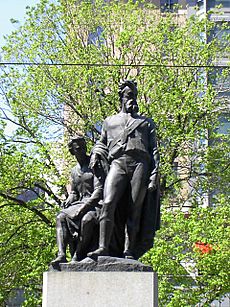
In June 1860, Burke was chosen to lead the Victorian Exploring Expedition. William John Wills, his third-in-command, was the mapmaker and observer.
The expedition started from Melbourne on August 20, 1860. There were 19 men, 27 camels, and 23 horses. They reached Menindee on September 23, 1860. Some people left the group there.
The first group reached Cooper Creek on November 11, 1860. This was 400 miles further on. The rest of the group was supposed to catch up. After a break, Burke decided to quickly travel to the Gulf of Carpentaria. They left on December 16, 1860. William Brahe was left in charge of the main party. Burke, William Wills, John King, and Charley Gray made up the small team. They reached the mangroves near the Flinders River on February 9, 1861. This was close to where Normanton is now. Heavy rains and swamps meant they never saw the open ocean.
The return journey was very hard. They were already weak from hunger and being out in the weather. Heavy monsoon rains made their progress slow. Gray died four days before they reached Cooper Creek. The other three rested for a day to bury him.
They finally reached the meeting point on April 21, 1861. This was 9 hours after the rest of the group had given up waiting. The others had left a note and some food. They had not been met by the group that was supposed to return from Menindee.
Burke, Wills, and King tried to reach Mount Hopeless. This was the closest settled area in South Australia. But they could not make it. They returned to Cooper Creek. While waiting for help, Wills died from being tired and hungry. Soon after, Burke also died. This happened at a place now called Burke's Waterhole on Cooper Creek. The exact date of Burke's death is not known for sure. But it is generally thought to be June 28, 1861.
King survived because Aboriginal people helped him. He was rescued in September by Alfred William Howitt. Howitt buried Burke and Wills. He then returned to Melbourne. In 1862, Howitt went back to Cooper Creek. He dug up Burke and Wills' bodies. He took them to Adelaide and then by ship to Melbourne. Their bodies were displayed for two weeks. On January 23, 1863, Burke and Wills had a large public funeral. They were buried in Melbourne General Cemetery. On that same day, Stuart and his team were welcomed in Adelaide. They had successfully crossed Australia from south to north.
Places Named After Burke
Many places in Australia are named after Robert Burke:
- Burketown, Queensland
- Burke River in western Queensland
- O'Haras Gap, in the Selwyn Ranges, Queensland
Places Named by Burke
Burke also named some places himself:
- The Cloncurry River was named by Burke. He named it after Lady Cloncurry. She was his cousin, Elizabeth Kirwan.
See also
 In Spanish: Robert O'Hara Burke para niños
In Spanish: Robert O'Hara Burke para niños
- John King (explorer)
- List of people on stamps of Ireland
- William John Wills
 | May Edward Chinn |
 | Rebecca Cole |
 | Alexa Canady |
 | Dorothy Lavinia Brown |


